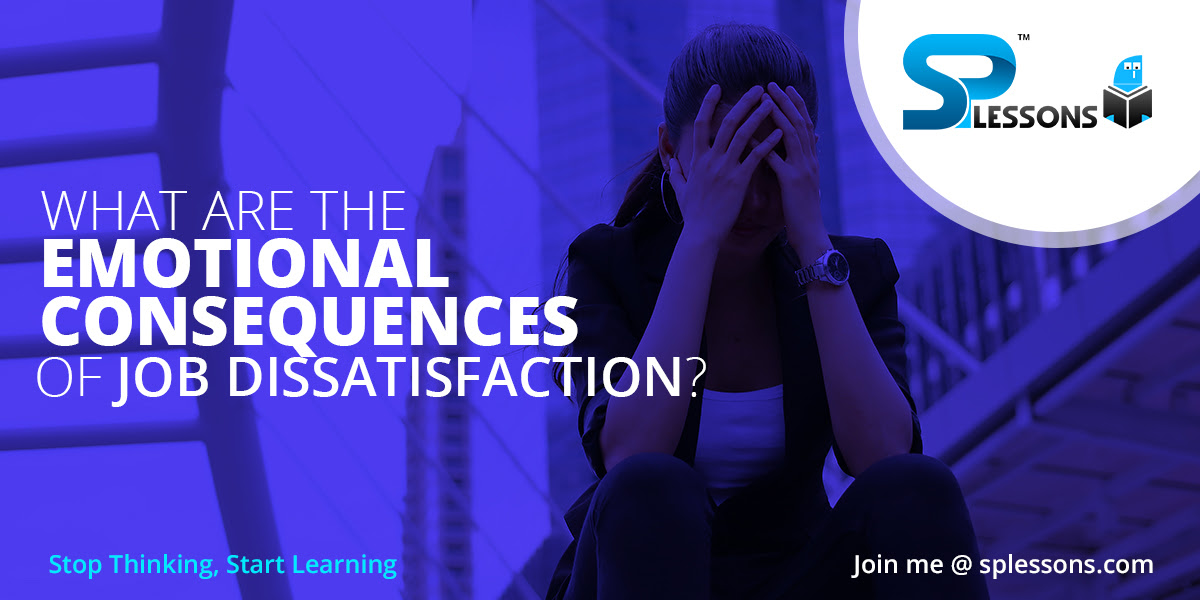 Introduction
Introduction
Are you dissatisfied with your work? Are you emotionally strained? Know what might be the Emotional Consequences of Job Dissatisfaction. This article written by Salini Vineeth is a great initiative towards understanding the emotional consequences of job dissatisfaction.
 Article
Article
Emotional Consequences of Job Dissatisfaction - Article
During the research for my upcoming novel, I came across a book named “Lost Connections” by British writer Johann Hari. I was listening to the audio book while doing my daily chores. My heart suddenly ached when the narrator announced a new chapter – “Disconnection from Meaningful Work”. I was so overwhelmed with memories that I couldn’t concentrate on my work or the book. While Hari’s thick British accent continued reading in the background, I went back to an evening three years back.
It was around the middle of 2016, I was returning home after a particularly hectic day at work. There is a narrow railway underpass on my way home. Vehicles from only one direction could pass it at a time. However, two-wheeler usually crossed the underpass freely, without a care in the world – just like anywhere else in Bangalore. As I reached near the underpass, there was a car waiting in the queue. Another car – a Scorpio – was coming in the opposite direction from a considerable distance. I calculated that my scooter could easily pass through and I overtook the stopped car in front of me. As I was about to enter the underpass, I stopped, frozen with terror. The Scorpio that was coming from the opposite direction picked up speed, and it seemed like it was coming to a head-on collision with my scooter.
I didn’t have the time to think about jumping to the other side. There was no space on the narrow road either. After a few seconds, the vehicle hit on my front mudguard with a slight thud. I wasn’t hurt; I had my legs planted firmly on the ground. I didn’t even fall down. After the moments of fear passed, fury took over me. I parked my scooter in the middle of the road to shout at the driver who seemed to hit me intentionally.
“You were on the wrong side of the road.” The driver told me in a heedless tone. It frustrated me that I didn’t know enough Kannada to argue with him. I could only repeat in broken sentences.
“You came and hit me, directly.” I repeated, at the top of my voice, almost hysterically. The traffic started building up slowly and soon there was a bunch of bystanders watching the tamasha. However, the other driver remained indifferent, refusing to apologize. He repeated that it was my mistake not to wait in the queue. None around me intervened to alleviate the tension. Tears started rolling down my cheek which I furiously wiped away. Someone tried to move my scooter to the side to make way for other vehicles. I rebuked him as well, but he did manage to move my scooter. After a few minutes, two-wheelers started passing and there was persistent honking behind me, I moved to the side of the road – sniffling and trying hard to gulp down the tears. I saw the vehicle that hit me driving away and soon the traffic resumed as if nothing had happened. I stood there, wondering what should I do next. There was nothing to be done. It was over, I was wronged.
I started my scooter in a trance. I came home and there was no one at home. I shut the door and cried uncontrollably. All the while I was feeling that a grave injustice was done to me. I had no control over the situation. Even after an hour, I couldn’t stop crying. It was like the accident triggered something in me. “I am worthless, I have no control over anything in my life, I don’t matter to anyone, and there is no one to help me” My brain kept churning out self-destructive sentences, one after the other.
Months after the incident, on many occasions, I wondered, what made me so uneasy on that evening? It was normal to get angry at the spot of an accident. Shouting at the other driver wasn’t a big deal by Bangalore standards. But, what made me cry hours even after the incident? I was in a way fortunate that I wasn’t harmed. Even though it was a norm for a two-wheeler in Bangalore to wedge into any gaps in the traffic, I could have avoided the entire episode just by waiting in the queue. Then I realized that it is not the accident itself made me furious, it was my lack of control over the situation. I felt so helpless that I was furious. There were a lot of pent-up emotions and they busted out though a small emotional crack created by the accident. I had no idea what was happening to me.
After 3 years, I could finally reconnect the dots, while I listened to the book “Lost Connections”. It is a book that studies various reasons for depression and anxiety in our generation. I realized that I was having an anxiety attack that evening, even though I couldn’t recognize it. It was not just the arrogance of the car driver that triggered it. Depression and anxiety were building up in me for a very long time before this incident.
At that time, I was going through a stagnant phase at work. The project that I was working for two years had almost come to an end. There was no new project that I could dive into. I got up every day, dreading about what to do in the office. There were, of course, a lot of mundane, daily chores I could use to fill my day. But they did not make any difference to me. I was slowly getting “disconnected” from meaningful work. It was bad, but the worse, I did nothing to change my position. Instead, I let myself fall into this lethargy, loathing my job and life in general. Even though there wasn’t any workload at the office, I was getting stressed. It spilled over to my non-working hours as well. I came home tired and disappointed.
“Nothing that I do matter”, “I don’t make any difference to anybody’s life”, “My role in this world is insignificant”, “Why am I even here?” these were some of the thoughts that crossed my mind frequently during those days. On that particular evening, I had hit a rock bottom.
In his book “Lost Connections” Johann Hari describes a meeting he had with a person named Joe. Joe was a worker at a paint store, who mixed paint all day, every day. It was a moronic job. Joe had started questioning the point of his existence. As I read through that chapter, I could instantly relate to Joe. Even though my job wasn’t nearly as mind-numbing as his, I have been through everything that he had been. Just like Joe, disengagement from meaningful work had triggered my depression and anxiety. I was constantly feeling worthless and I believed that there was nothing I could do to change my situation.
I had a lot of free time at the office. I did not have much responsibility, and no one waited above my cubicle for the deliverable. Still I was stressed- it was an irony. But when I recently read about the work of Michael Marmot, a leading researcher in the field of Social Determinants of Health, I could clearly see why my work ( or lack of it) depressed me. In his hallmark social experiment named the Whitehall Study, Michael Marmot conducted research on thousands of British civil servants during 1970s. He wanted to find out if the rate of cardiovascular diseases in British Civil Servants was influenced by their nature of work. In British civil service, there is a strict hierarchy. There are people at the top of the pyramid who held a lot of responsibility, they had to take risks and make difficult decisions. Then there were these people at the bottom of the pyramid, who had more desk jobs – Typists, stenographers, office assistants. When he started his study, Marmot expected that the people at the bottom of the pyramid, who seemed to have light jobs were at a lower risk for any disease. The top bureaucrats – whose decisions even could cause a war – were assumed to have a much stressful life. However, when the results of the study came out, it startled Marmot. The possibility of cardiovascular diseases was more prominent in the people at the bottom of the pyramid. People at the top, who had more responsibility and thereby more control over their work was at a lower risk. Marmot further went on to study this disparity. He realized that the top bureaucrats could implement their ideas at work and make a difference. It gave them a purpose for their life. But the lower-ranking employees had to complete any job that was shoved in their way, without completely understanding it. They had to deaden themselves to put through that kind of work. Also, people at the top of the hierarchy seemed to have more social connections and had an exuberant life outside the work. They met up for parties and games. The people at the bottom of the hierarchy tend to have fewer social connections.
Even though the Whitehall study wasn’t directly applicable in my case, I could separate out traces of similarity. I knew what I was doing. I also knew I was making a difference, somewhere in someone’s life. However, I couldn’t impart more meaning and passion for my work. I couldn’t enrich it. I had fallen into the trap of routine, and I didn’t care to actively take action to change the routine. Slowly, I accepted the notion that my job was indeed boring and I couldn’t do anything about it. When I look back, I realize that it was a very wrong notion.
I used to travel a lot during 2014 – 2016. I loved to explore archaeological destinations and learn about their history. I started a travel website in 2014. After every journey, I wrote articles on my website. In the initial days, I thoroughly enjoyed writing them. As the website picked up momentum, I started feeling a certain compulsion to write more articles and keep the page rank up. It started sounding like a job and started to look mundane to me. This taught me a great philosophy in life. Any passion, any interest, when it turns into work, it tends to become boring. Without active effort from a person to enrich his/her own work, any great job gradually turns dull and routine. It was happening in my life around the time of that accident and it triggered my extreme reaction.
In an interesting turn of events, two years after that incident, I took a break from my engineering job to write full time. Stepping outside of the corporate world helped me put things into perspective. Now I can look back at my work and assess what I did wrong. Maybe if I had tried a little harder, put more effort to find interesting projects or speak to my manager, I could have felt better. If it didn’t work, I could have looked outside my organization for new opportunities. But, there was something that trapped me in that situation. I am still not clear what it is. But my best guess is, it was a lack of a wider perspective. I keep remembering a dialog from the movie Hugo. The young Hugo Cabret tells his friend Isabelle;








